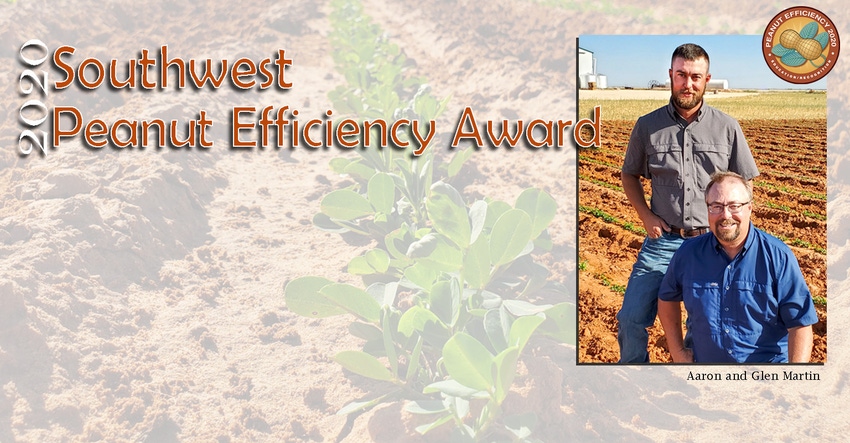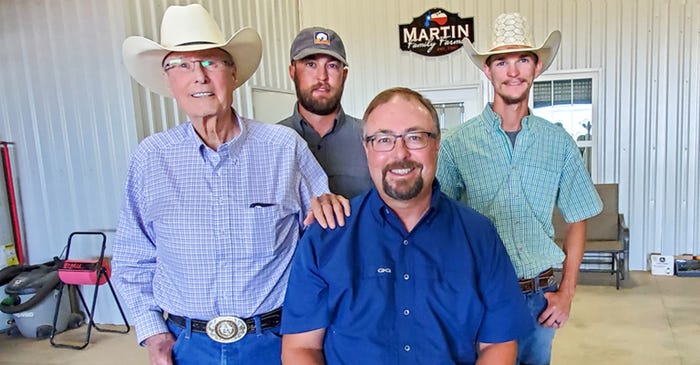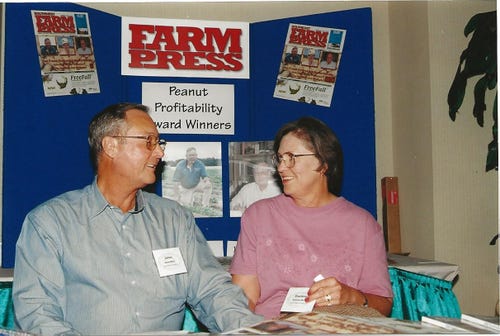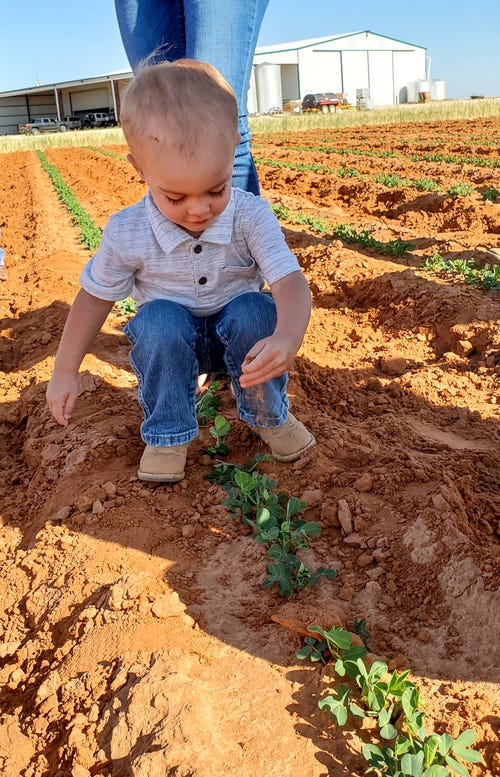
The sandy soils near Wellman, Texas, not only produce high peanut yields on the Martin family farm but also support generations of Peanut Efficiency Award winners.
In 2000, James Martin received the first Farm Press Peanut Profitability Award, now known as the Peanut Efficiency Award (PEA). Twenty years later, James's son Glen and grandson Aaron are the 2020 recipients.
"It really pleases me to see the boys do well," says James, flanked by Glen, Aaron and his other grandson Kirk in their barn office. "I taught them everything I know. They've had to learn the rest of it on their own."

PEA winners are nominated and chosen based on high yields produced at the lowest cost per acre. Program advisor for the award, Marshall Lamb, research leader with the National Peanut Research Laboratory at Dawson, Ga., designed a measurement tool growers use to determine production efficiency. Winners are chosen from the Southwest, Upper Southeast, Lower Southeast, and Delta growing regions.
 (James Martin and his late wife Sharlene at the PEA breakfast in 2000. Photo by Ron Smith)
(James Martin and his late wife Sharlene at the PEA breakfast in 2000. Photo by Ron Smith)

Looking Back
As James reflects on changes in peanut production over the last 20 years, he says water availability is the biggest. "We don't have near the water we had back then. It's going to be a continual problem as time goes on."
In 2000, the Martins could irrigate two circles (360 acres) with 400 gallons of water. "Now, we're down to 325 gallons on one circle," Glen says. "We've cut back on the number of acres of peanuts we grow, so we're not trying to plant more acres than we can water but keep enough water to make the yields."
In a region with limited and often untimely rainfall, about 16 to 18 inches per year, and seasonably dry, hot summer temperatures, "If we spread acres too thin and get a hot spell and can't keep up, we just don't want to do it that way," Glen says. "We want to grow peanuts where we have enough water."
Collectively, the Martins farm about 10,000 acres, 2,500 under center pivots. But Glen says they are limited on where they can plant peanuts, "We've got some farms where we don't put peanuts because the water's a little salty. But where we do grow them, we really try to push them."
Key to Success
James has retired, so Glen and Aaron, along with Kirk, Glen's younger son, continue to farm the family land and also farm independently. Glen and Aaron, through their partnership, A&G Farms, grow Georgia 09B, a runner-type variety. In 2019, they averaged 5,619 pounds per acre and 5,697 pounds in 2018 at $475 per ton.
Their secret to success? "We can't tell you," Glen jokes. "It's mainly water. We try not to grow more than we can water." But he says plant health is also important.
See photo gallery, Martin family yields three generations of PEA winners
The Martins rotate wheat, cotton and peanuts. The wheat stubble has proven helpful in cotton production, but Glen says in peanuts, "we just don't like it as well."
Weed control in minimum till and wheat stubble proved difficult. "They just don't yield as well for us," Aaron says.
 (Rhett Martin, the son of Lisa and Aaron Martin, plays in the dirt in his daddy's peanut field.)
(Rhett Martin, the son of Lisa and Aaron Martin, plays in the dirt in his daddy's peanut field.)
Variety selection is also important. Aaron says disease tolerance is a priority. "Grandad used to grow a bunch of Virginias. We've switched around and found a variety that seems to work well for us. And once we found it, we haven't changed."
The Martins primarily battle pod rot and leaf spot. "We try to be preventive. Because we are trying to put enough water on peanuts, we've got to be careful with the disease," Glen says. In July, they apply a shot of Azoxystrobin, followed by another one later in the season.
The Martins leave disease and insect detection to crop consultant Mark Scott, who has scouted their fields for the last 30 years. "I attribute some of our success to him," Glen says. "Mark stays on top of insect and diseases for us."
Scott also introduced them to Velum nematicide. "Mark had us do a test plot a few years ago. We put Velum on a half circle but not on the other half. In a September satellite image, it was a night and day difference. The vines crashed on the half that wasn't treated," Glen says.
"We've started using Velum on every acre of peanuts. It keeps the vines healthy in the fall when we start having disease or weather issues that could make them crash. Why it works? I don't know. But it's sold us enough that we think it's worthwhile. It's expensive, but it's worth it."
Weed Control
Also key to production is weed control. "We like to keep our fields clean," Glen says. "We don't like to spray some of the things that can be sprayed late in the year, due to drift issues, so it comes down to staying ahead of the weeds with pre-emergents."
They apply Sonalan before planting. "As soon as we plant, we come in with a shot of Panther (generic Valor). That's a tremendous chemical that works great for weed control," Glen says. "We have to get it out before crack and then water it in. That'll last about four to six weeks. And we try to get ahead of that with a shot of Dual. We chemigate it. It usually works pretty good."
See video, No easy fix for 2020 PEA winners
Inoculant
Inoculants are also essential. During planting, they apply a liquid inoculant in furrow on top of the seed. "It's really important," Glen says. "To keep it alive, when we have it at the barn, we keep it in a room where it's 66 degrees. When it goes to the field, it sits under the trailer in the shade. So, we're real cautious about everything.
"Every little step we take in peanut production or in any crop production is important."
Family
Also essential to their success is family. "I was blessed to work with my dad all those years and we worked well together," Glen says. "Now, I'm blessed to have two sons wanting to do it. I don't think they want to do anything else."
Kirk, who began farming fulltime in 2016, describes his dad as a good manager. "You have good management skills, you keep everybody in line." Glen responds, "I've taken that role but it's not without consulting — I'm not the big guy in charge." James counters, "I never was either."
The Martin wives also play critical roles. Aaron's wife, Lisa, is the farm bookkeeper. They have three children Tenley, Sadie and Rhett.
Glen's wife, Gwynn, is an attorney and handles the farm's legal work such as setting up LLCs and creating a farm succession plan.
"Dad accumulated farmland and we've accumulated land together," Glen says. "His dream was to keep it together. Years from now, he doesn't want it broken up into 30 landlords. So, Gwynn set it up where it all stays together."
Martin Family, from left, Lilyan Key, Glen and Gwynn Martin, Gracen Key, Laurie and Kirk Martin, James Martin, Lisa and Aaron Martin, with their three children Tenley, Sadie and Rhett. Missing from the photo is daughter Shelbi Hannsz, who lives in Lubbock with her husband Ryan, and their two children Morgan and Haley.
Glen and Gwynn have three daughters: Gracen and Lilyan Key and Shelbi Hannsz, who lives in Lubbock with her husband Ryan, and their two children Morgan and Haley.
Kirk's wife, Laurie, is a new addition to the Martin family as of a year ago. She works fulltime in Lubbock but serves as the family photographer and helps Kirk on the farm when she can.
Employees also play an important role in the Martin's success, Aaron adds. "We couldn't do any of this without good employees. EC Harlan has been a part of our team for several years — his contribution is very valuable. And we hired two new guys this year and they are also working out well."
As the Martin interview ended, James says, "I have something to say. We're Christians. It's always been my theory if you're farming or whatever job you've got, you've got a responsibility to do it well.
"It's our philosophy that we should be good stewards of the land and it will take care of you."
About the Author(s)
You May Also Like






